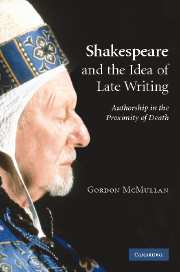Book contents
- Frontmatter
- Contents
- Acknowledgements
- Introduction
- 1 Shakespeare and the idea of late writing: authorship in the proximity of death
- 2 The Shakespearean caesura: genre, chronology, style
- 3 The invention of late Shakespeare: subjectivism and its discontents
- 4 Last words/late plays: the possibility and impossibility of late Shakespeare in early modern culture and theatre
- 5 How old is ‘late’? Late Shakespeare, old age, King Lear
- 6 The Tempest and the uses of late Shakespeare in the theatre: Gielgud, Rylance, Prospero
- Notes
- Index
5 - How old is ‘late’? Late Shakespeare, old age, King Lear
Published online by Cambridge University Press: 22 September 2009
- Frontmatter
- Contents
- Acknowledgements
- Introduction
- 1 Shakespeare and the idea of late writing: authorship in the proximity of death
- 2 The Shakespearean caesura: genre, chronology, style
- 3 The invention of late Shakespeare: subjectivism and its discontents
- 4 Last words/late plays: the possibility and impossibility of late Shakespeare in early modern culture and theatre
- 5 How old is ‘late’? Late Shakespeare, old age, King Lear
- 6 The Tempest and the uses of late Shakespeare in the theatre: Gielgud, Rylance, Prospero
- Notes
- Index
Summary
From my sixth year I have had a passion for sketching the form of things. From about the age of fifty I produced a number of designs, yet of all I drew prior to my seventieth year there is truly nothing of any great note. In my seventy-third year I finally apprehended something of the true quality of birds, animals, insects, fishes, and of the vital nature of grasses and trees. Therefore in my eightieth year I shall have made some progress, in my ninetieth I shall have penetrated even further into the deeper meaning of things, in my hundredth year I shall have become truly marvellous, and at one hundred and ten each dot, each line shall surely possess a life of its own. I only beg that gentlemen of sufficiently long life take care to note the truth of my words.
The seventy-one-year-old artist has previously talked of retirement. But that would now seem to have been premature. ‘My new concept,’ he announced, ‘is that I am into my late period. Most artists go potty as they get older: dafter and madder as they get more celibate. So I am consciously going to do that’.
The account by the Japanese artist Hokusai of the relationship of age to creative achievement, which was written in 1834, may belong to a culture quite other than the Western tradition I have been examining in this book, a culture with very different attitudes both to old age and to creativity, but it chimes productively, if somewhat uncomfortably, nonetheless, both in its seriousness and in its apparent irony, with the discourse of lateness that I have mapped by way of Shakespearean reception history.
- Type
- Chapter
- Information
- Shakespeare and the Idea of Late WritingAuthorship in the Proximity of Death, pp. 259 - 317Publisher: Cambridge University PressPrint publication year: 2007



